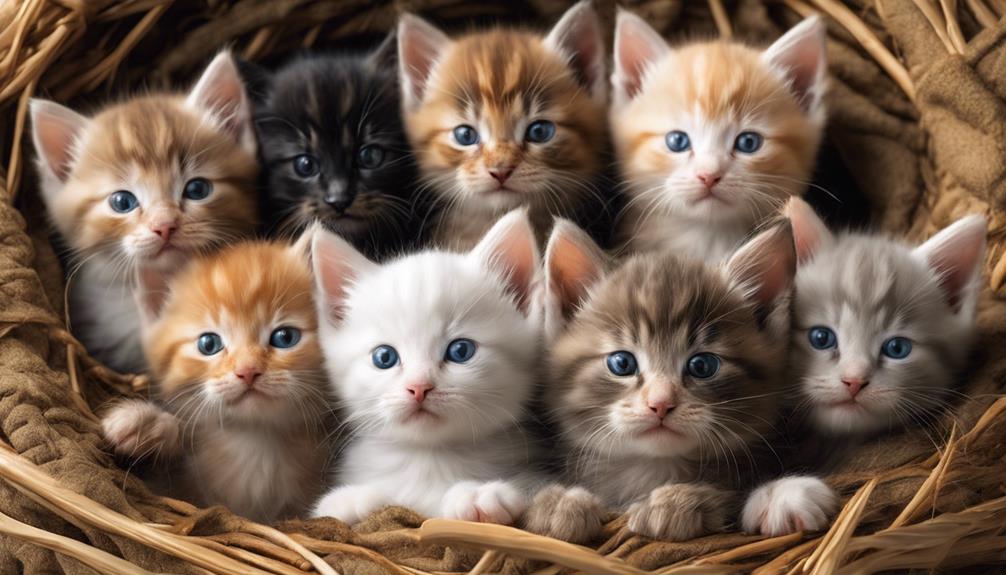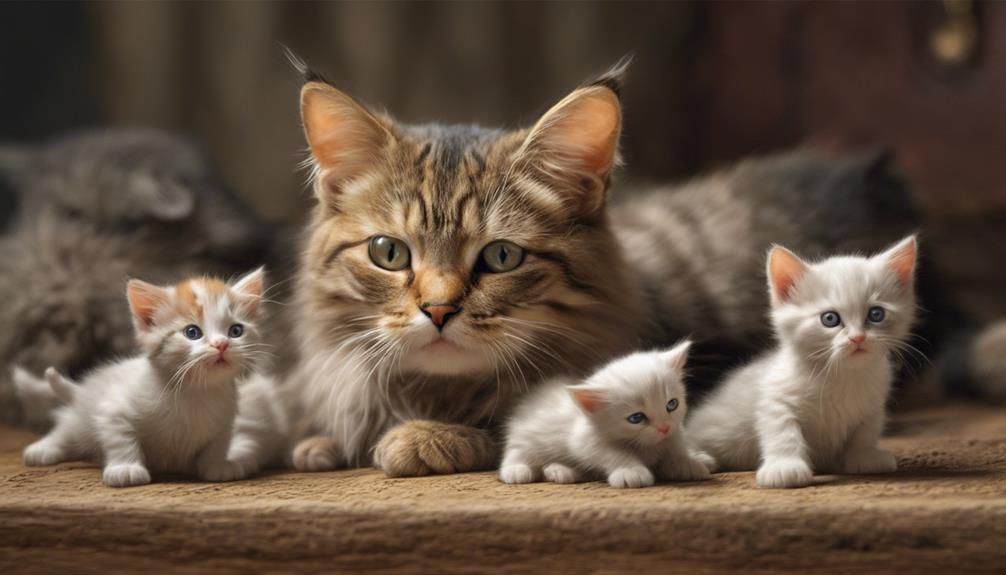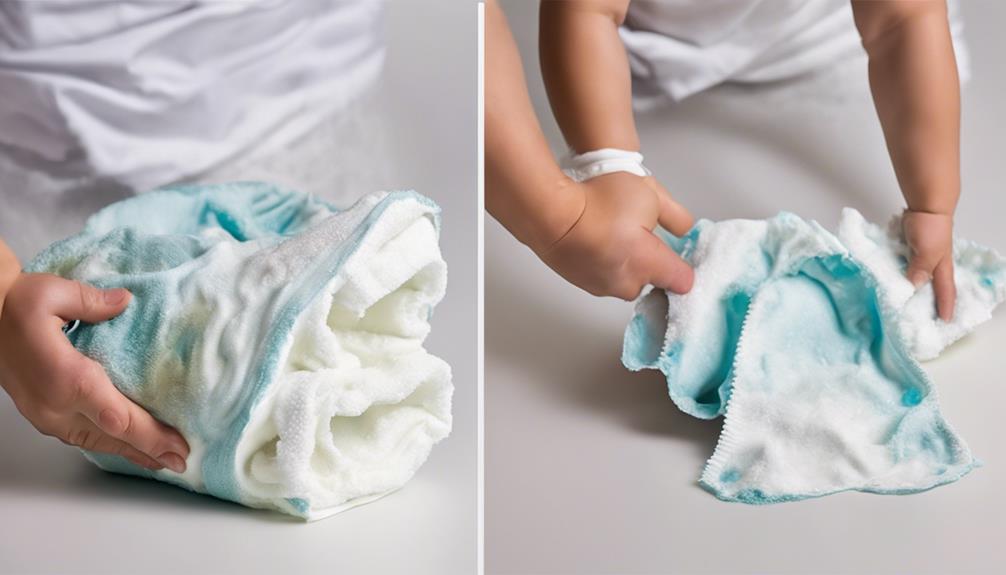As cat owners, we all know that caring for newborn kittens can sometimes feel like deciphering a cryptic message. When it comes to the topic of how often these tiny felines poop, it's like untangling a ball of yarn – intricate, yet essential.
But have you ever wondered about the frequency of these minuscule bathroom breaks and what it means for their well-being? Let's unravel this mystery together and shed light on the lesser-known aspects of kitten bowel movements.
Key Takeaways
- Newborn kittens poop multiple times a day, often after each feeding, indicating good digestion.
- Healthy kittens should have at least one bowel movement daily, showing proper nutrition absorption.
- Monitoring poop frequency, consistency, and color helps detect digestive issues early for prompt care.
- Seek veterinary help for constipation, persistent diarrhea, abnormal stool colors, or lack of bowel movements.

Petmate Litter Pan, Blue/Gray, Small, Made in USA
OPEN-TOP KITTY LITTER BOX: This large cat litter pan provides ample space on all sides for cats to…
As an affiliate, we earn on qualifying purchases.
As an affiliate, we earn on qualifying purchases.
Frequency of Newborn Kitten Pooping
Newborn kittens typically have multiple bowel movements throughout the day, usually occurring after each feeding. It's essential for cat owners to monitor the frequency of these bowel movements as it provides valuable insights into the kitten's health and well-being. Healthy newborn kittens may poop as often as every 2-4 hours, indicating a well-functioning digestive system. Regular bowel movements are a positive sign, showcasing that the kitten is receiving adequate nutrition and their body is effectively processing it.
Monitoring the frequency of newborn kitten poop is important in identifying any potential health issues early on. A lack of bowel movements in newborn kittens could signal underlying problems that require veterinary attention. By keeping a close eye on the kitten's poop patterns, owners can promptly address any concerns and make sure their furry companion receives the necessary care. Remember, regular and healthy bowel movements are key indicators of a happy and thriving newborn kitten.

VetriScience Gut Health Chews, Probiotic Everyday Digestive Supplement for Cats, Pet Probiotics for Digestion Support, Gas and Diarrhea, Immune Support, 120 Million CFU Per Chew, Duck, 60 Count
Daily Probiotic for Cats: Help your cat thrive with these daily probiotic chews designed to promote optimal gut…
As an affiliate, we earn on qualifying purchases.
As an affiliate, we earn on qualifying purchases.
Normal Poop Patterns in Newborn Kittens

As we observe the development of newborn kittens, it becomes important to understand the regularity and characteristics of their bowel movements to assure their health and well-being.
- Kittens typically start pooping independently around 3-4 weeks of age.
- Healthy newborn kittens should have at least one bowel movement per day to indicate proper digestive function.
- Monitoring the frequency, consistency, and color of kitten poop is essential for evaluating their health status and ensuring they're on the right track for growth and development.
Understanding the normal poop patterns in newborn kittens is critical for proper kitten care. It allows us to detect any potential digestive issues early on and address them promptly to maintain the health and well-being of the kittens. By keeping a close eye on their pooping habits, cat owners can intervene if necessary and provide the necessary care to support the kittens in their journey to becoming healthy adult cats.

Petmate Litter Scoop for Cats, Large Size, Bleached Linen
Large Cat Litter Scoop: The 4.2 inch wide and 1.7 inch long mouth (not including handle) was built…
As an affiliate, we earn on qualifying purchases.
As an affiliate, we earn on qualifying purchases.
Identifying Healthy Kitten Poop
When evaluating the health of newborn kittens, one key aspect is identifying what constitutes healthy kitten poop. Healthy kitten poop is typically solid and brown in color, indicating a well-functioning digestive system. However, one should bear in mind that meconium, the first poop produced by kittens, may appear dark or green initially. Abnormal colors like red, black, or yellow in kitten poop could be a sign of underlying health issues and should be monitored closely. Additionally, the presence of mucus or blood in kitten stool may suggest a potential infection that requires veterinary attention. Gray, white, or orange-colored kitten poop may also signal digestive problems that need to be addressed promptly.
| Category | Description | Indications |
|---|---|---|
| Color | Solid and brown | Healthy digestion |
| Dark or green | Meconium in newborns | |
| Red, black, yellow | Abnormal, seek advice | |
| Texture | Mucus or blood | Potential infection |
| Gray, white, orange | Underlying health issues |

vivometra Home Check 4-in-1 Feline Home Wellness Kit – Easy Cat Health Monitor 2 (Pack)
Perfect for Home Use, No Fuss to OperateCovers 4 key aspects of cat health monitoring, with zero operational…
As an affiliate, we earn on qualifying purchases.
As an affiliate, we earn on qualifying purchases.
Warning Signs of Kitten Digestive Issues

Regular monitoring of a kitten's digestive habits is important for promptly identifying warning signs of potential digestive issues. When observing your kitten, be on the lookout for the following signs that may indicate digestive problems:
- Constipation: If your kitten doesn't poop after meals, it could be a sign of constipation, which may require veterinary consultation.
- Diarrhea: Persistent diarrhea in kittens can lead to dehydration, necessitating veterinary attention to guarantee further complications.
- Abnormal Stool: Keep an eye out for any changes in your kitten's stool, such as unusual color, consistency, or presence of blood, as this could indicate underlying digestive issues.
Being vigilant about these warning signs and closely monitoring your kitten's digestive health can help in early detection and timely intervention. If you notice symptoms like vomiting, fever, or any other concerning digestive issues, it's advisable to seek veterinary help promptly to safeguard your kitten's well-being.
When to Seek Veterinary Help
Monitoring a newborn kitten's behavior and digestive patterns is essential for identifying when to seek veterinary help. If a newborn kitten shows signs of being constipated, such as not pooping after meals, it's vital to consult a veterinarian promptly. Persistent diarrhea can quickly lead to dehydration in newborn kittens, necessitating immediate veterinary attention to prevent further complications.
Additionally, if a kitten is experiencing vomiting, running a fever, or displaying abnormal stool consistency, seeking veterinary help is imperative to address any underlying health issues. A lack of bowel movements in newborn kittens can also indicate the presence of potentially serious conditions that require professional evaluation.
Consulting a veterinarian is paramount in ensuring the health and well-being of newborn kittens, as they're delicate and can deteriorate rapidly if issues with their bowel movements are left unattended.
Frequently Asked Questions
How Often Should a Newborn Kitten Poop?
We monitor how often newborn kittens poop to guarantee their health. Typically, they might poop 1-2 times daily. Variations can occur based on diet and health. Regular, soft bowel movements suggest good health, but consult a vet for any concerns.
How Long Can Newborn Kittens Go Without Pooping?
We, as caretakers, know newborn kittens can go up to 24-48 hours without pooping. This delay, like a gentle rain nurturing the earth, is normal due to their developing systems. Monitoring their poop frequency is important for their health.
How Long Do Mother Cats Eat Their Kittens Poop?
We've observed mother cats typically eat their kittens' poop for the first few weeks post-birth. This instinctual behavior aids in nest cleanliness and predator deterrence. Usually, mothers stop once kittens gain bowel control.
Can 2 Week Old Kittens Poop on Their Own?
Yes, at 2 weeks old, most kittens cannot poop on their own and require stimulation. We gently help them with bowel movements until they develop independence around 3 weeks. It's essential for their comfort and hygiene.
Conclusion
To sum up, keeping track of your newborn kitten's poop schedule is essential for their health and well-being. Remember, a poop a day keeps the vet away!
Stay vigilant for any changes in their poop patterns and don't hesitate to seek veterinary help if needed.
Your little furball's bathroom habits may not be glamorous, but they're a key indicator of their overall health.
Happy pooping, cat owners!









